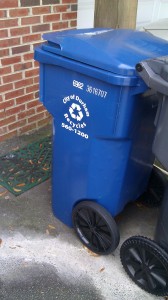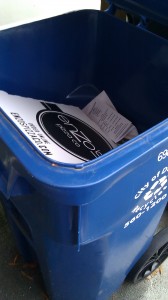Last updated on November 25, 2011
According to an article in USA Today, the Hilton hotel chain is going to donate the partially used soap bars its customers leave behind to charity:
Hilton Worldwide has partnered with Atlanta-based nonprofit Global Soap Project to donate discarded soap from its 3,750 properties to be recycled for use in impoverished communities throughout the world.
In the first year of the partnership, the hotel chain expects to provide more than 1 million new 4-ounce bars of soap. Over the next three years, Hilton will also contribute $1.3 million to the effort.
Global Soap Project, founded by Uganda native Derreck Kayongo, uses a process of sanitizing, melting and remolding discarded soap from hotels throughout the country. Since 2009, the organization has sent recycled soap to 20 countries on four continents, including Afghanistan, Ecuador and Haiti.
Forgive my asking — and I am truly agnostic about this question — but isn’t this just another case of #SWEDOW (the acronym stands for “stuff we don’t want”)? Wouldn’t the recipient countries just be better off with the money made from selling the recyled soap in the US? Or from Hilton using its own (sanitized, melted, and remolded) discarded soaps and giving away the savings from doing so?
I haven’t visited that many sub-Saharan African countries (only Ethiopia, Madagascar, and Mali), but in all three places, I remember seeing soap that was made locally. Even if it were not dumping as per World Trade Organization rules, wouldn’t sending all that soap to those countries depress local industries? Is this really what we want?
Twitter for Dummies
When retweeted that article, someone on Twitter responded:
“SWEDOW or re-cycled product? Prefer Africa shea butter soap, but reality is soap in demand.”
Soap’s in demand? So is food. And when I pointed out that most African countries had their own soap-making industries, which this charity might well depress, that same person told me:
“as by-product bio-fuel industry — FOREIGN owned (to meet home country bio-fuel regs). Knee jerk criticism of RECYCLING wrong”
Right, because criticizing an entire industry because it is foreign-owned is not a knee-jerk reaction. Of course not.
Lest anyone question my recycling cred, here is what’s in the back of our house:

And here is what’s inside what’s in the back of our house:

Also, for anyone who would like to engage me in a conversation via social media, here is a bit of advice. Tweets like these:
“Guess academics can AFFORD cynicism”
“Suggest visit w/ Duke’s medical school and ask about connection SOAP and disease control…”
“Whatever happened to intellectual curiousity [sic]? Suggest study market dev early US – recycling/used goods stepping stones growth.”
Those tweets tell more about the twit that tweets them than they tell about my thoughts and thinking–especially when the twit that tweets them is cowardly comfortably hiding behind an anonymous Twitter account.
Hilton’s Bits and Pieces of Soap: #SWEDOW?
Last updated on November 25, 2011
According to an article in USA Today, the Hilton hotel chain is going to donate the partially used soap bars its customers leave behind to charity:
Hilton Worldwide has partnered with Atlanta-based nonprofit Global Soap Project to donate discarded soap from its 3,750 properties to be recycled for use in impoverished communities throughout the world.
In the first year of the partnership, the hotel chain expects to provide more than 1 million new 4-ounce bars of soap. Over the next three years, Hilton will also contribute $1.3 million to the effort.
Global Soap Project, founded by Uganda native Derreck Kayongo, uses a process of sanitizing, melting and remolding discarded soap from hotels throughout the country. Since 2009, the organization has sent recycled soap to 20 countries on four continents, including Afghanistan, Ecuador and Haiti.
Forgive my asking — and I am truly agnostic about this question — but isn’t this just another case of #SWEDOW (the acronym stands for “stuff we don’t want”)? Wouldn’t the recipient countries just be better off with the money made from selling the recyled soap in the US? Or from Hilton using its own (sanitized, melted, and remolded) discarded soaps and giving away the savings from doing so?
I haven’t visited that many sub-Saharan African countries (only Ethiopia, Madagascar, and Mali), but in all three places, I remember seeing soap that was made locally. Even if it were not dumping as per World Trade Organization rules, wouldn’t sending all that soap to those countries depress local industries? Is this really what we want?
Twitter for Dummies
When retweeted that article, someone on Twitter responded:
“SWEDOW or re-cycled product? Prefer Africa shea butter soap, but reality is soap in demand.”
Soap’s in demand? So is food. And when I pointed out that most African countries had their own soap-making industries, which this charity might well depress, that same person told me:
“as by-product bio-fuel industry — FOREIGN owned (to meet home country bio-fuel regs). Knee jerk criticism of RECYCLING wrong”
Right, because criticizing an entire industry because it is foreign-owned is not a knee-jerk reaction. Of course not.
Lest anyone question my recycling cred, here is what’s in the back of our house:
And here is what’s inside what’s in the back of our house:
Also, for anyone who would like to engage me in a conversation via social media, here is a bit of advice. Tweets like these:
“Guess academics can AFFORD cynicism”
“Suggest visit w/ Duke’s medical school and ask about connection SOAP and disease control…”
“Whatever happened to intellectual curiousity [sic]? Suggest study market dev early US – recycling/used goods stepping stones growth.”
Those tweets tell more about the twit that tweets them than they tell about my thoughts and thinking–especially when the twit that tweets them is
cowardlycomfortably hiding behind an anonymous Twitter account.Share this:
Published in Commentary, Development and Miscellaneous